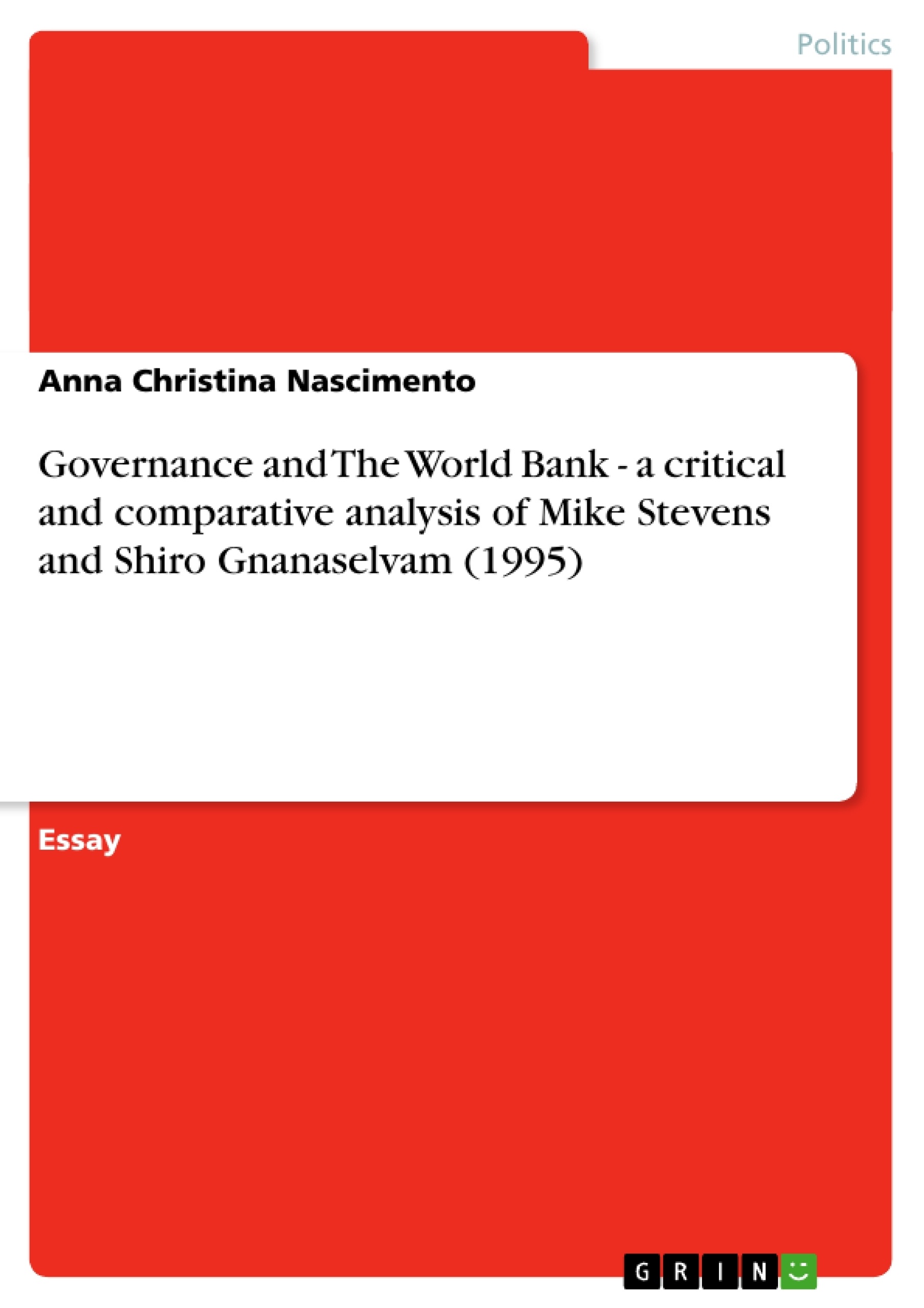Extracto
Table of Contents
Introduction
Conceptual Framework.
Impartiality of World Bank’s policies
Governance as a liberal based concept.
Practical case: The World Bank in Brazil
Conclusions
Bibliography
Introduction
The World Bank’s activities throughout the world are a recurrent object of analysis. This can be explained, in great scale, due to the importance and impact of the Bank’s policies and recommendations upon local societies and governments.
The World Bank mandate is clearly restricted to the economic and financial aspects of government. Based on this, the Bank assumes an official neutral position in regard to internal politics of all countries with which it works, as presented on the article of Stevens and Gnanaselvam. However, several scholars, such as Williams and Young, argue that such neutrality is difficult, because any policy proposed by the Bank is based on pre-established premises, which are based on liberal ideals, which end up been forced upon the countries that want to receive a Bank’s loan.
This paper will present both perspectives and apply the concepts discussed on an empirical case, in order to allow the evaluation of which perspective is more coherent with real cases.
Conceptual Framework
The concept of governance has an increasing importance on the activities’ definition of several international organizations concerned with development worldwide. Governance is understood here, as defined by the World Bank in its publication Governance and Development, in 1992, as “the manner in which power is exercised in the management of a country’s economic and social resources for development”[1]. In this sense, three aspects of governance are distinguished: “(i) the form of political regime; (ii) the process by which authority is exercised in the management of a country’s economic and social resources for development; and (iii) the capacity of governments to design, formulate, and implement policies and discharge functions”[2]. All three aspects are interconnected and are important in forming the base for government activities.
If we understand that “the characteristics of any state, anywhere, are largely defined by its relations with the economy and society which it reflects and both represents and dominates, in its historical, regional, and international context”[3], observing a country’s governance will allow the analysis of the country’s main political and social characteristics. With this, it is possible to work towards solving its main weaknesses. Working towards good governance would, based on this, be indeed intrinsically related with working towards a country’s development.
Based on this assumption, the international organizations that work with development have included governance as a fundamental analytical tool to assess if a country has the basic characteristics that will lead to development. The idea is that a sound government will lead to the desired economic development, or, even more pragmatically, “strong and effective states are inconceivable without strong economies. And strong economies are inconceivable without the institutions of state that make them possible”[4].
The Bank has, since the end of the 1980, started to include governance aspects in its developmental policies. With this, it started to extrapolate its initial area of work, going beyond just economic and financial projects. With this, some debates were raised concerning the Bank’s capacity to maintain neutrality and the influence of its theoretical perspective on the funded projects.
Impartiality of World Bank’s policies
Mike Stevens and Shiro Gnanaselvam describe the World Bank as an institution that has the objective of working towards the development of economic and financial policies, maintaining its neutrality towards political and social issues. In terms of governance, their article show that the relation between the Bank and its partner countries is of equilibrium, with the Bank assuming an observer position, making recommendations and basing its decisions on economic facts.
The World Bank distinguishes clearly governance as an analytical framework and as an operational concept. Concerning the three aspects of governance previously presented, the Bank has restricted itself for working only with the second and third aspects, more linked to economic and financial politics. This is based on the fact that the Bank has the goal to maintain itself neutral regarding political decisions in all countries where it operates. All its decisions are based on the analysis of the condition of the country to pay back the loan. The assumption is that “while recognizing that governance will always have a political dimension, the Bank operationally restricts itself to the economic dimensions of governance”[5].
Most of the Bank’s work is based on the improvement of public sector management, including civil service reform, public financial management, public enterprise reform and government decentralization reforms. It also has projects aimed on developing a legal framework that enables the country’s economic development. Such projects include legal and regulatory reforms, creation of legal framework for market economy, improvement of economic related laws, among others.
The legal reforms are based on the idea that “economic growth through the commitment of human, technological, and capital resources depends greatly on a set of rules securing property rights, governing civil and commercial behaviours, and limiting the power of the state”[6]. The authors highlight that the Bank’s legal framework reforms are restricted to commercial and economic law.
In the last decade, the Bank has placed participatory issues as part of its political approach. There is an understanding that in some areas the projects have a higher chance of success when they involve beneficiaries and stake-holders since the design phase. The authors highlight the fact that the Bank works towards convincing the national government to include participatory activities in the project elaboration, as the Bank cannot compromise its neutrality by reaching the stakeholders on their own.
[...]
[1] (Stevens/ Gnanaselvam, 1995:97)
[2] (Stevens/ Gnanaselvam, 1995:97)
[3] (Leftwich, 2005:139)
[4] (Leftwich, 2005:153)
[5] Stevens/ Gnanaselvam, 2005:97
[6] Stevens/ Gnanaselvam, 2005:98
- Citar trabajo
- Bachelor in International Relations Anna Christina Nascimento (Autor), 2006, Governance and The World Bank - a critical and comparative analysis of Mike Stevens and Shiro Gnanaselvam (1995) , Múnich, GRIN Verlag, https://www.grin.com/document/78497
Así es como funciona























Comentarios